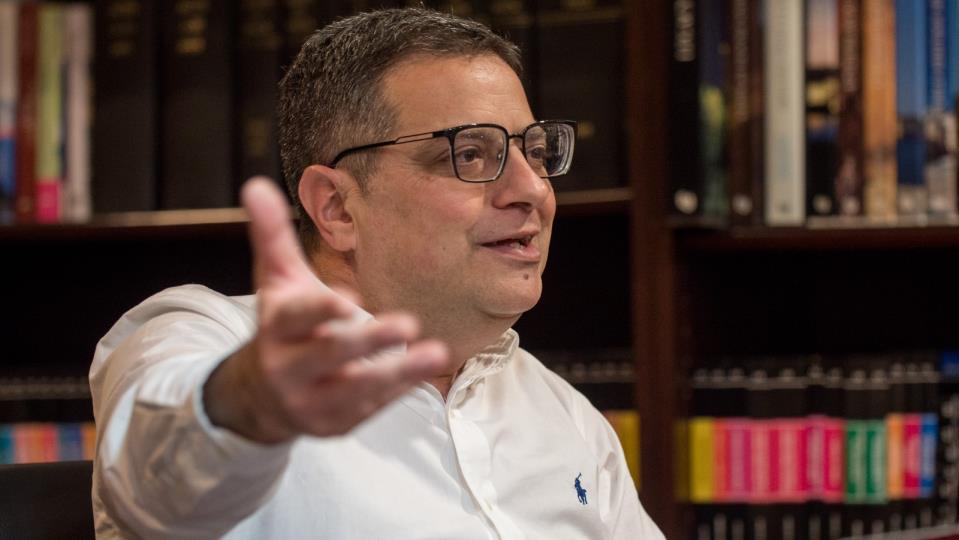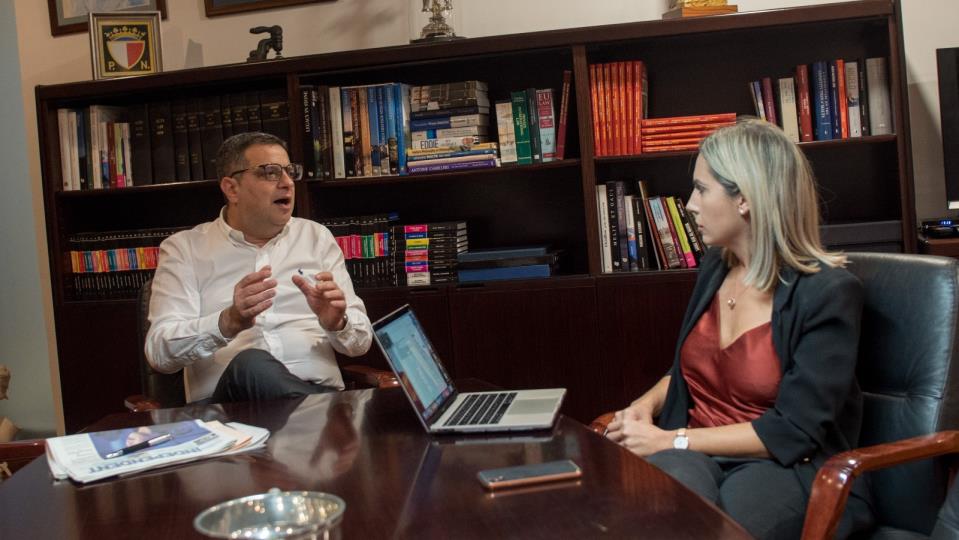Leader of the Opposition Adrian Delia reiterated "I am not a racist" during an interview with The Malta Independent on Sunday, referring to several comments by people who consider his discourse as being xenophobic.
The latest round of criticism came after Delia’s reply to the Budget speech, earlier this week.
Delia noted that he used to travel a lot when he was younger, as a student at university, discovering different cultures, religions and races. He says it was a world of diversity and learning and insists "there is not one thread of racism in me".
He continued to highlight that 'me' refers to him as an individual and not as a political figure.
Recalling an experience he had with some friends when visiting Ethiopia he said: "It does not even occur [to me] that just the different colour of someone’s skin can change who a person is. I cannot imagine discriminating against someone just because s/he comes from a different race."
When questioned about his issue with migration, Delia said "I have a problem with the numbers of people coming to Malta, which are unplanned, in a country which is also tiny and which is the most densely populated in Europe."
Due to the dense population, Delia believes that we cannot have an economic plan which depends on more people coming to Malta. He adds that these people can come from 'wherever', even if they are Maltese from Australia or Canada.
"It is a numeric evaluation, it has nothing to do with colour, race or religion," he insists.

Intelligent immigration
Delia mentioned in his reply to the Budget speech that both the type and number of people the government is bringing in is a problem. He explains that we need "intelligent immigration" which he clarifies as 'planned' and 'smart' immigration, calculating where the country needs to get to.’
In fact he said he was 'insulted' when the Prime Minister asked why he does not agree with the IIP scheme because it equates to people having money, insinuating that intelligence and money are one and the same thing.
Since 1987, Nationalist governments had a vision for Malta to invest in sectors like financial services, aviation, pharmaceuticals, bringing about the need for expertise in these areas. As a result, the jurisdiction created legislature for such people to come to Malta.
Delia explained that people came to Malta and settled here while also teaching and learning, resulting in a merger of different people who are specialised, describing this as ‘healthy.’
Attracting people to Malta in areas where they are required is not a problem, he said: “But being such a small country, we cannot afford the luxury for just anyone coming here.”
At least in the past the Labour Party used to say they wanted Malta to become ‘Switzerland in the Mediterranean’. Delia said that right or wrong this was a statement and a vision for the country.
We have to make a decision as to where we want to go, he stated.
Insisting that numbers show that the government’s economic model is based on the influx of workers, Delia expressed his concern that if the economy is to continue to grow, where will these workers be housed.
"We already have young people, couples, families who are finding it impossible to purchase property, very difficult to get a bank loan, as banks are starting to refuse loans and it is also hard to rent."
Attracting people from sectors such as the financial services will not increase rents further as he says this is "not a volume market".

Classism
Delia insists his arguments are also not classist as it is not the same thing as attracting better people.
“If I want to improve myself and earn more and educate myself and live a better life, it is not a question of classism but quality. Classism is treating people differently because they come from a different social class.”
He maintains that government should help people improve themselves.
Better tourists, rather than more tourists
"With all the traffic and air pollution, we are downgrading the quality of the tourist product. Inevitably, different types of tourists come to Malta. This government is trying to raise the number of tourists without trying to improve the quality of the product."
When questioned if it is a matter of class, Delia said it was a choice based on the size of the country. He said this is why there is a government to decide whether to create a quality or cheap tourism sector.
His ultimate aim, Delia says in this case, is to improve the quality of the country and it is not about the people.
The Nationalist Party wants to increase the level of quality of everything "air, education, tourism, environmental well-being”, he said.

Discourse taken out of context
During a political activity last month, Delia questioned if the government would seek teachers from Bangladesh and Pakistan to teach children in Malta. This comment was immediately seized upon by the Labour Party as racist.
Questioned about this, Delia explained that the comment was “completely taken out of context”.
When he made this statement, it had followed a discussion on transport. Delia insisted the government was disrespecting teachers, despite their limited number and questioned whether it was their intention to get them from Pakistan and Bangladesh, just as they had done with bus drivers. "The main point there was to respect our teachers.”
At a General Workers' Union conference, Delia had also hit out at third-country nationals saying if the country had to bring in foreign workers, "they should at least be from the European Union".
Delia defended this statement, which was denounced as xenophobic, saying that he had been referring to pensioners. In this case, pensioners from the EU receive their pension from the original member state as well as from Malta, as per EU regulations.
"If he is a third-country national he does not receive both pensions so the quality of his spending power is less.”
He explained that with regard to workers, the logical preference should also be from the EU given the freedom of movement and the benefits enjoyed by both countries.
“The general argument is not that I do not want coloured people in Malta, or not coming from a specific country. I think we have a problem with the increasing number of people resident in Malta in such a short period of time. It is not the type of people.”

Not safe to walk the streets under Labour
A few years back there were numerous articles naming Malta as one of the safest countries in the world. Lately, Delia says, lawlessness has prevailed perhaps due to what he calls “ghettoism”.
Delia insists ghettos are not formed only by people of race but by a cluster of people who establish themselves temporarily in a particular area. Giving the example of Bugibba, he said the ghettos there are not formed by coloured people.
These clusters tend to be occupied by young males who come here to work and send money home. “They come from poorer countries and cannot afford to come with their family. They live six in one apartment. They then form clusters or even gangs.”
He recalled the episode that was widely reported when he went to Marsa on a Sunday morning and found the police station closed. That day there were 13 or 14 people lingering on the streets which Delia called “unsavoury.”
“Again here it is not an argument of racism but an argument of good policing. In my mind the Commissioner of Police is failing; he is failing to keep law and order in different localities.”
“In Marsa, where there are the open centres there may be more coloured people. Most of them are probably the nicest people in the world, I do not know them. I have no problem with them working here as long as they are here legally. The problem is when they are completely unregulated, running aimlessly around in the streets.”
PN’s plan for the future
Denouncing the construction industry, Delia highlights sectors like aviation, business aviation, film, research and development in pharmaceuticals, agriculture, banking that create quality jobs and should be the plan for the future.
He believes that continuing to build is not the right thing but when asked if this will result in him becoming unpopular Delia said: “I would rather be innovative and speak to these people to see how one can stop the environment from being a hurdle for economic growth in the property sector and making the environment the motor of economic development in itself.”